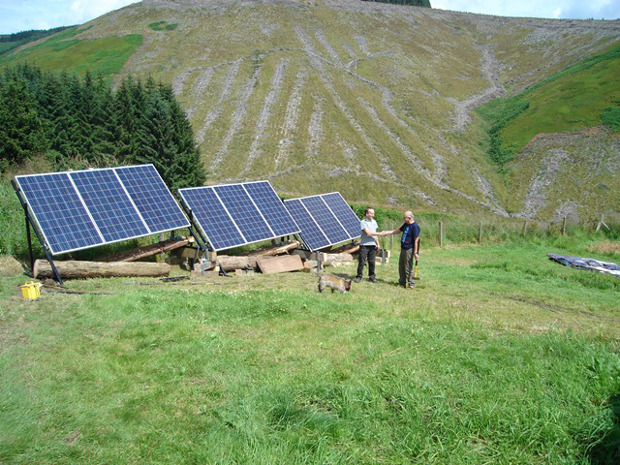Three years ago, The Whiteburnshank Trust approached Decerna to investigate high running costs for their outdoor education centre; an old shepherd’s cottage located in the heart of Kidland Forest. This centre has an off-grid electricity system with 24V battery bank, a 2.5kW wind turbine, 6 x 150W PV modules and a 10kW diesel generator for back up. Our recommendations at the time included more regular maintenance of the battery cells and generator, more efficient use of electricity (including better user awareness) and potentially charging per-unit to reflect the very expensive costs of diesel genset charging. Additional PV was an option, but at the time considerably expensive.
Three years on, with the development of the PV market, PV module costs have fallen dramatically to the region of £0.50/Wp and The Trust reconsidered extra PV. The original PV system uses modules designed for battery charging which are now increasingly difficult to source and very expensive compared to those designed for grid connected systems.
Decerna recommended fitting around 2kWp of ‘grid market’ PV modules connected to the existing battery system using a max power point solar charger to regulate the output to the batteries. We worked with a steel fabrication company (Life Engineering in Washington) to design tilted racks to mount the array. Due to the sloping site, the modules are arranged in groups of three rather like a stepped terrace of housing. Each unit is wired as a series string, with the resulting approx. 100 volts DC fed to the battery room via armoured cable.
The tilted racks are anchored to ground using stakes and ballasted with tree trunks (the plan is is to build a ‘ballast garden’ of small shrubs to blend with surroundings)
Soon after connection, in a clear sunny cloud break, the system delivered impressive results, with a charging current of 70 amps delivered to the batteries and an indicated power of 1850 Watts. This is double the current delivered to the batteries by the generator so should help improve the battery state of charge considerably.

Background on Whiteburnshanks
Whiteburnshank has been lived in for many years and is one of only three farms that remain in use in the Kidland forest today. In 1993 the Whiteburnshank Trust was set up to provide a centre for young people in the county. The trust is responsible for developing and maintaining the centre and is made up of a small committee of volunteers who manage, maintain and try to develop and improve the centre. It is non profit making and has only a small working income which just covers costs and routine maintenance. Further information, and booking enquiries, can be found at http://www.whiteburnshank.org.uk. Available 365 days a year, the cottage is ideal for groups and is used Scouts, guides, D of E, school groups, bona fide organisations etc.
Upper Coquetdale electricity supply
Many properties in the Upper Coquet valley and other remote rural areas of Northumberland do not have access to grid electricity. This can present real problems for residents in terms of the extra cost of alternative power sources which is invariably diesel generators for electricity, and in the more remote areas this presents additional problems of cost, noise and delivery access for bulk diesel delivery. The problem is quite widespread and a recent petition to Northumberland County Council to invest resources in studying the issue attracted over 450 signatures [1].





